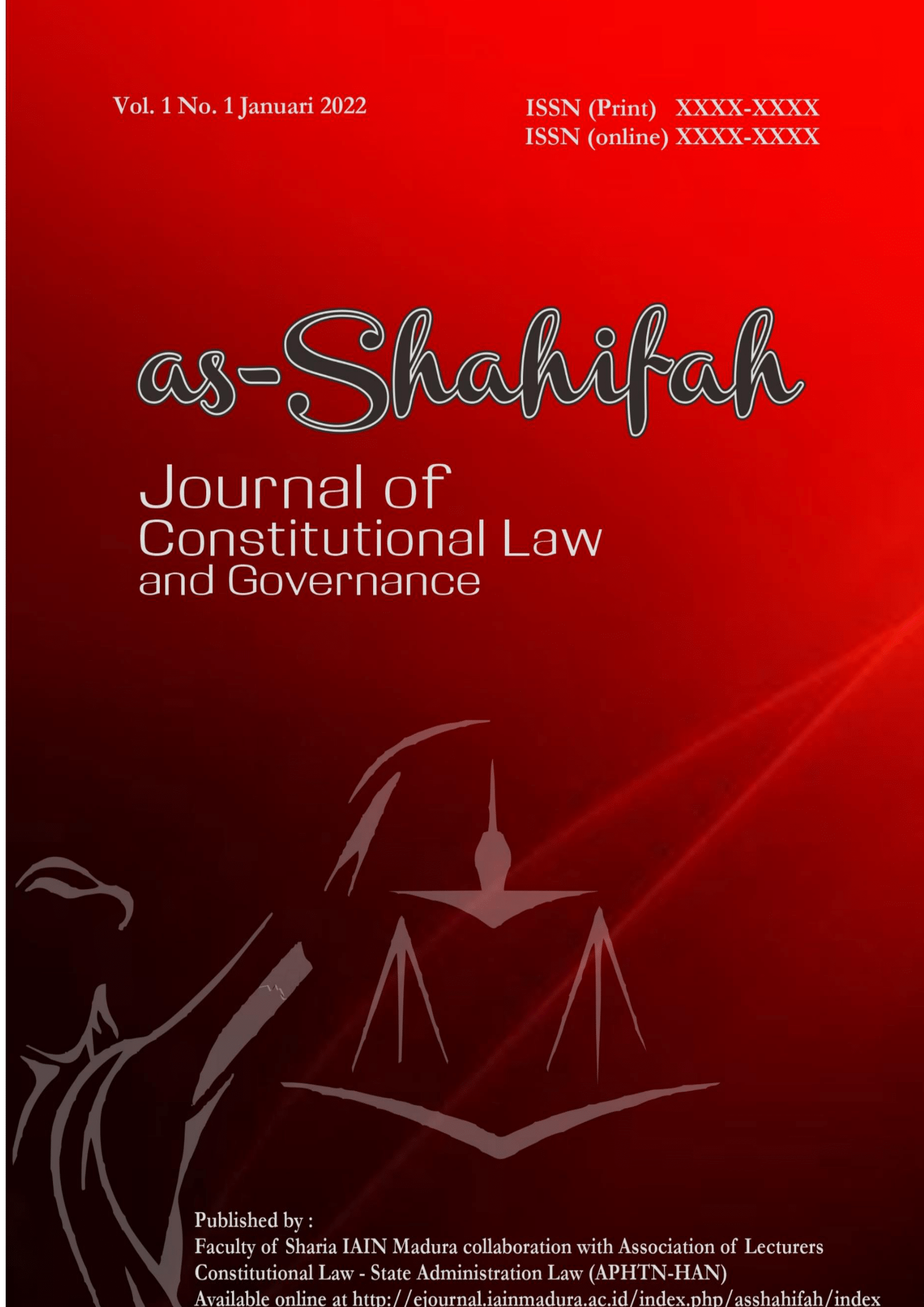Konstruksi Judicial Order dalam Putusan Mahkamah Konstitusi
 Abstrak views: 274
,
Abstrak views: 274
,
 PDF (English) downloads: 265
PDF (English) downloads: 265
Abstrak
The decision of the Constitutional Court is a legal product produced by the Court, whose decision is final and binding. The meaning of the final and binding clause means that since the decision is read in front of the court it is open to the public, has binding legal force and there is no further legal action. This research includes normative juridical research, using a statutory approach and a conceptual approach. Juridically the authority of the judicial order is implied in Articles 10 and 23 of Law no. 15 of 2019 amendments to Law no. 12 of 2011 concerning the Establishment of Legislation, and is explained again in DPR Regulation No. 13 of 2016 concerning procedures for drafting a national legislation program. The construction of the judicial order lies in the final and binding nature of the Constitutional Court's decision itself. Follow-up actions are not always delegated to the legislature, because in practice it is permissible for relevant institutions that have the authority to issue orders or regulations so that there is no legal vacuum for too long and does not interfere with the running of the government.
##plugins.generic.usageStats.downloads##
Referensi
Inosentius. Pengkajian Hukum Tentang Putuusan Mahkamah Konstitusi. akarta: Badan Pembinaan Hukum Nasional Kemen kumham RI. 2009
Johny Ibrahim. Metode Penelitian Hukum Normatif. Malang; Bayuu Media. TT.
Moh. Mahfud MD. Perdebatan Hukum Tata Negara Pasca Amandemen Konstitusi. Jakarta: Rajawali Pres. 2011.
Mukhlis dkk. Kekuatan Hukum Putusan Mahkamah Konstitusi Terhadap Pencabutan. TT.
Nomensen Sinamo, Hukum Tata Negara Suatu Kajian Kritis Tentang Kelembagaan Negara. Jakarta: Permata Aksara, 2012.
Peraturan Mahkamah Konstitusi No. 3 Tahun 2019 tentang Produk Hukum Mahkamah Konstitusi.
Peraturan Mahkamah Konstitusi No. 6 Tahun 2005 tentang Pedoman Beracara dalam Perkara Pengujian Undang-Undang.
Peter Mahmud M. Penelitian Hukum. Jakarta; Prenada Madia Group. 2016.
PMK No. 6 Tahun 2005 tentang Pedoman Beracara dalam Perkara Pengujian UU.
Retno W. & Iskandar O, Hukum Acara Perdata dalam Teori dan Praktik. Bandung, Mandar Maju. 2009.
Siti Partiah, Judicial Order Oleh Mahkamah Konstitusi dalam Pengujian Undang-Undang terhadap UUD NRI Tahun 1945. Surabaya: Tesis Pascasarjana UIN Sunan Ampel Surabaya. 2020.
Syukri dan Kawan-Kawan, Model dan Impelementasi Putusan MK Dalam Pengujian UU (studi Putusan Tahun 2003-2012). Jakarta: Pusat Penelitian dan Pengkajian Perkara Pengelolaan Tehnologi Informasi dan Komunikasi MK.
Tim Penyusun Hukum Acara Mahkamah Konstitusi. Hukum Acara Mahkamah Konstitusi. Jakarta: Sekretaris Jenderal dan Kepaniteraan MKRI, Cet. I, 2010.
Undang-Undang Dasar Negara RI Tahun 1945.
Undang-Undang No. 8 Tahun 2011 tentang Undang-Undang Mahkamah Konstitusi.
Publishing your paper with As-Shahifah : Journal of Constitutional Law and Governance means that the author or authors retain the copyright in the paper. As-Shahifah granted an exclusive non commercial reuse license by the author(s), but the author(s) are able to put the paper onto a website, distribute it to colleagues, give it to students, use it in your thesis etc, so long as the use is not directed at commercial advantage or toward private monetary gain. The author(s) can reuse the figures and tables and other information contained in their paper published by As-Shahifah in future papers or work without having to ask anyone for permission, provided that the figures, tables or other information that is included in the new paper or work properly references the published paper as the source of the figures, tables or other information, and the new paper or work is not direct at private monetary gain or commercial advantage.
As-Shahifah journal provides immediate open access to its content on the principle that making research freely available to the public supports a greater global exchange of knowledge. This journal is licensed under a Creative Commons Attribution-ShareAlike 4.0.This license lets others remix, tweak, and build upon your work non-commercially, and although their new works must also acknowledge & be non-commercial, they don’t have to license their derivative works on the same terms.
As-Shahifah journal Open Access articles are distributed under this Creative Commons Attribution-ShareAlike 4.0 International License (CC BY-SA). Articles can be read and shared for noncommercial purposes under the following conditions:
- BY: Attribution must be given to the original source (Attribution)
- SA: If you remix, transform, or build upon the material, you must distribute your contributions under the same license as the original.









